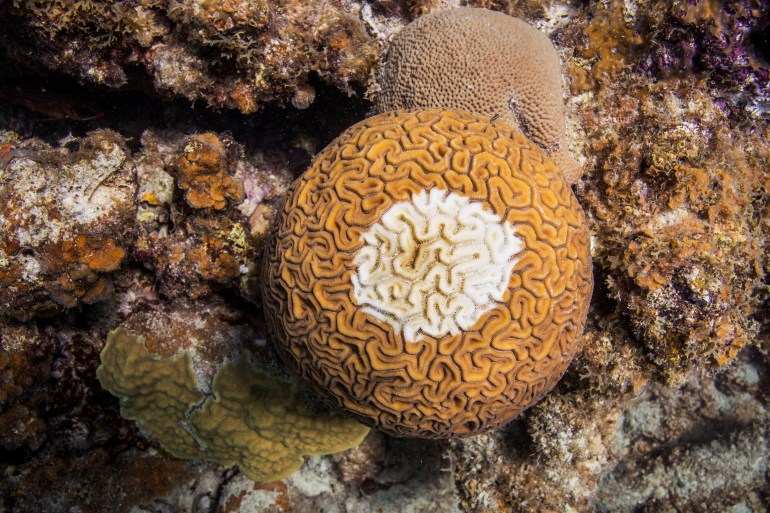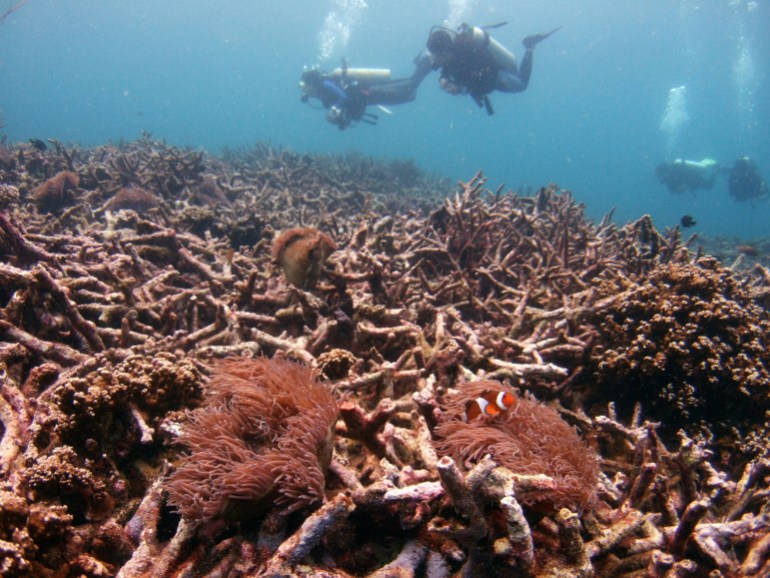[
Alongside coastlines from Australia to Kenya and Mexico, most of the world's colourful coral reefs have turned ghostly white in what scientists say is the fourth international bleaching occasion previously three many years.
The US Nationwide Oceanic Atmospheric Administration (NOAA) Coral Reef Watch, the world's high coral reef monitoring physique, stated on Monday that at the very least 54 nations and territories have skilled large-scale bleaching with their reefs by February 2023 due to local weather change. Resulting from this the floor water of the ocean has develop into hotter.
“From February 2023 to April 2024, important coral bleaching has been recorded in each the northern and southern hemispheres of each main ocean basin,” Coral Reef Watch coordinator Derek Manzello instructed reporters.
Corals are invertebrates that reside in colonies. Their calcium carbonate secretions type exhausting and protecting scaffolding that serves as house to many colourful species of single-celled algae.
Coral bleaching is brought on by water temperature anomalies that trigger corals to expel the coloured algae residing of their tissues. With out the assistance of algae to ship vitamins to the coral, corals can not survive.
“Greater than 54 % of reef areas within the international ocean are experiencing bleaching-level warmth stress,” Manzello stated.

Like this yr's bleaching occasion, the earlier three – in 1998, 2010 and 2014–2017 – additionally coincided with the El Niño local weather sample, which generally ushers in hotter ocean temperatures.
Sea floor temperatures final yr broke information set since 1979, as the results of El Niño are exacerbated by local weather change.
In flip, Australia's Nice Barrier Reef, the world's largest coral reef system and the one coral reef system seen from house, has been severely affected, in addition to the South Pacific, the Purple Sea and a wider space of the Gulf. Has occurred.
“We all know that the largest risk to coral reefs world wide is local weather change. The Nice Barrier Reef is not any exception,” Australia's Surroundings Minister Tanya Plibersek stated final month.
Caribbean reefs skilled mass bleaching final August as coastal sea floor temperatures had been 1–3 °C (1.8–5.4 °F) above regular.
Scientists working within the area then started to doc mass deaths all through the area. From staghorn to mind coral, “the whole lot you could possibly see throughout the dive was white in a number of the reefs”, Lorenzo Alvarez-Filipe, a marine ecologist at Mexico's Nationwide Autonomous College, instructed Reuters.
“I've by no means seen this stage of bleaching.”
On the finish of the Southern Hemisphere's summer time in March, tropical reefs within the Pacific and Indian Ocean additionally started to undergo harm.

Scientists have warned that most of the world's reefs will be unable to recuperate from intense warmth stress for lengthy.
“What's occurring is new to us and to science,” Alvarez-Filipe stated.
“We can not but predict how properly severely confused corals will carry out,” he stated, “even when they survive rapid warmth stress.”
Repeated bleaching occasions are additionally overturning earlier scientific fashions, which predicted that when international warming reached 1.5 levels Celsius (2.7 F) above pre-industrial temperatures, 70 % to 90 % of the world's floor would disappear. Coral reefs could also be destroyed. To this point, the world has warmed by about 1.2 C (2.2 F).
In a 2022 report by the United Nations Intergovernmental Panel on Local weather Change, consultants decided that just one.2 C (2.2 F) of warming can be sufficient to noticeably influence coral reefs, “Most out there proof means that coral- “Dominant ecosystems will stop to exist at this temperature.”

This yr's international bleaching occasion has additional heightened scientists' considerations that corals are in grave hazard.
“The reasonable clarification is that now we have handed the tipping level for coral reefs,” ecologist David Obura, who heads coastal ocean analysis and improvement in Indian Ocean east Africa from Mombasa, Kenya, instructed Reuters.
“They're headed for a decline that we are able to't cease except we truly cease the carbon dioxide emissions” which are driving local weather change, Obura stated.

